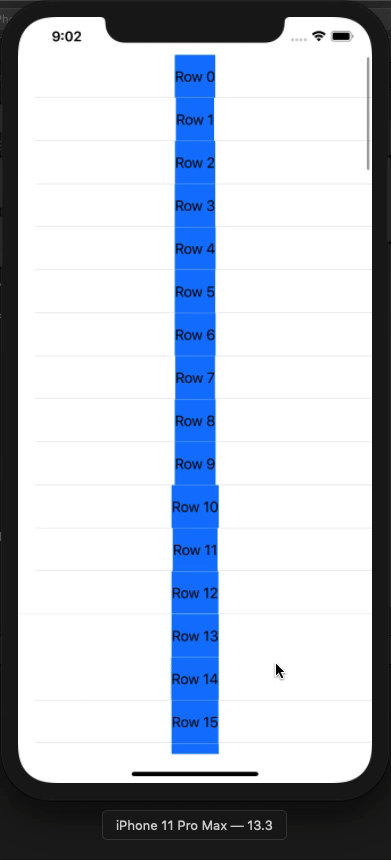SwiftUI中具有UIViewRepresentable的UITableView
我正在尝试在SwiftUI应用中使用UITableView
struct UIList: UIViewRepresentable {
var rows: [String]
func makeUIView(context: Context) -> UITableView {
let collectionView = UITableView(frame: .zero, style: .plain)
collectionView.translatesAutoresizingMaskIntoConstraints = false
collectionView.dataSource = context.coordinator
collectionView.delegate = context.coordinator
collectionView.register(UITableViewCell.self, forCellReuseIdentifier: "Cell")
return collectionView
}
func updateUIView(_ uiView: UITableView, context: Context) {
}
func makeCoordinator() -> Coordinator {
Coordinator(rows: rows)
}
class Coordinator: NSObject, UITableViewDataSource, UITableViewDelegate {
var rows: [String]
init(rows: [String]) {
self.rows = rows
}
func tableView(_ tableView: UITableView, numberOfRowsInSection section: Int) -> Int {
self.rows.count
}
func tableView(_ tableView: UITableView, cellForRowAt indexPath: IndexPath) -> UITableViewCell {
let tableViewCell = tableView.dequeueReusableCell(withIdentifier: "Cell", for: indexPath) //as! AlbumPrivateCell
let view = Text(rows[indexPath.row]).frame(height: 50).background(Color.blue)// UIFactory(appComponent:
let controller = UIHostingController(rootView: view)
let tableCellViewContent = controller.view!
tableCellViewContent.translatesAutoresizingMaskIntoConstraints = false
tableViewCell.contentView.addSubview(tableCellViewContent)
tableCellViewContent.topAnchor.constraint(equalTo: tableViewCell.contentView.topAnchor).isActive = true
tableCellViewContent.leftAnchor.constraint(equalTo: tableViewCell.contentView.leftAnchor).isActive = true
tableCellViewContent.bottomAnchor.constraint(equalTo: tableViewCell.contentView.bottomAnchor).isActive = true
tableCellViewContent.rightAnchor.constraint(equalTo: tableViewCell.contentView.rightAnchor).isActive = true
return tableViewCell
}
}
}
当我快速滚动表格时,单元格内容在每个单元格的顶部和底部都有一个随机填充,为什么会发生这种情况?
 PS:我知道我可以使用
PS:我知道我可以使用List,我尝试使用UITableView,因为我必须添加多个滑动动作,但是List仅允许一个滑动动作(删除)
1 个答案:
答案 0 :(得分:6)
我认为这是由于损坏的重用表视图单元所致……(并且可能丢失了主机控制器,因为在那里是在堆栈上创建的,而不是在任何地方存储的)
请在下面找到更正了您提到的修复程序的代码。经过测试并与Xcode 11.2 / iOS 13.2配合使用。
这里是代码(带有一些内联注释):
class HostingCell: UITableViewCell { // just to hold hosting controller
var host: UIHostingController<AnyView>?
}
struct UIList: UIViewRepresentable {
var rows: [String]
func makeUIView(context: Context) -> UITableView {
let collectionView = UITableView(frame: .zero, style: .plain)
collectionView.translatesAutoresizingMaskIntoConstraints = false
collectionView.dataSource = context.coordinator
collectionView.delegate = context.coordinator
collectionView.register(HostingCell.self, forCellReuseIdentifier: "Cell")
return collectionView
}
func updateUIView(_ uiView: UITableView, context: Context) {
}
func makeCoordinator() -> Coordinator {
Coordinator(rows: rows)
}
class Coordinator: NSObject, UITableViewDataSource, UITableViewDelegate {
var rows: [String]
init(rows: [String]) {
self.rows = rows
}
func tableView(_ tableView: UITableView, numberOfRowsInSection section: Int) -> Int {
self.rows.count
}
func tableView(_ tableView: UITableView, cellForRowAt indexPath: IndexPath) -> UITableViewCell {
let tableViewCell = tableView.dequeueReusableCell(withIdentifier: "Cell", for: indexPath) as! HostingCell
let view = Text(rows[indexPath.row])
.frame(height: 50).background(Color.blue)
// create & setup hosting controller only once
if tableViewCell.host == nil {
let controller = UIHostingController(rootView: AnyView(view))
tableViewCell.host = controller
let tableCellViewContent = controller.view!
tableCellViewContent.translatesAutoresizingMaskIntoConstraints = false
tableViewCell.contentView.addSubview(tableCellViewContent)
tableCellViewContent.topAnchor.constraint(equalTo: tableViewCell.contentView.topAnchor).isActive = true
tableCellViewContent.leftAnchor.constraint(equalTo: tableViewCell.contentView.leftAnchor).isActive = true
tableCellViewContent.bottomAnchor.constraint(equalTo: tableViewCell.contentView.bottomAnchor).isActive = true
tableCellViewContent.rightAnchor.constraint(equalTo: tableViewCell.contentView.rightAnchor).isActive = true
} else {
// reused cell, so just set other SwiftUI root view
tableViewCell.host?.rootView = AnyView(view)
}
tableViewCell.setNeedsLayout()
return tableViewCell
}
}
}
仅为UIList本身添加了演示代码-在专业模型上也可以正常工作。

struct TestUIList: View {
var body: some View {
UIList(rows: generateRows())
}
func generateRows() -> [String] {
(0..<100).reduce([]) { $0 + ["Row \($1)"] }
}
}
相关问题
- 从SwiftUI中的UIKit更新UIViewRepresentable大小
- SwiftUI-从未在UIViewRepresentable自定义选择器视图中调用过UITableView cellForRowAtIndexPath
- MacOS项目中未声明的类型'UIViewRepresentable'
- SwiftUI中UIViewRepresentable的大小
- SwiftUI中具有UIViewRepresentable的UITableView
- 带有UIViewRepresentable子类的链方法
- UIViewRepresentable在ScrollView中大小不正确
- 了解UIViewRepresentable
- UIViewRepresentable @state值未更新
- TableView重新加载在SwiftUI中无法与UIViewRepresentable一起使用
最新问题
- 我写了这段代码,但我无法理解我的错误
- 我无法从一个代码实例的列表中删除 None 值,但我可以在另一个实例中。为什么它适用于一个细分市场而不适用于另一个细分市场?
- 是否有可能使 loadstring 不可能等于打印?卢阿
- java中的random.expovariate()
- Appscript 通过会议在 Google 日历中发送电子邮件和创建活动
- 为什么我的 Onclick 箭头功能在 React 中不起作用?
- 在此代码中是否有使用“this”的替代方法?
- 在 SQL Server 和 PostgreSQL 上查询,我如何从第一个表获得第二个表的可视化
- 每千个数字得到
- 更新了城市边界 KML 文件的来源?